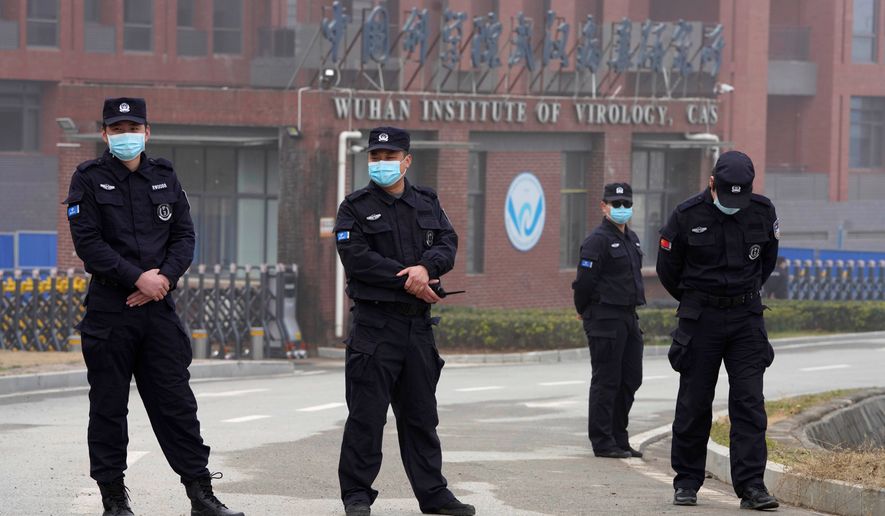New documents revealed Tuesday are offering new insights into the scope and target of U.S.-funded research on coronaviruses at the Wuhan Institute of Virology in China and raise new questions over the origins of the COVID-19 pandemic that has killed more than 4.5 million people around the globe.
The more than 900 pages of documents obtained by online investigative news site The Intercept through Freedom of Information Act litigation against the National Institutes of Health (NIH) offer previously undisclosed details of U.S.-based EcoHealth Alliance bat coronavirus research at the lab funded by the National Institute of Allergy and Infectious Diseases (NIAID).
The revelations also provoked fresh scrutiny of NIAID Director Anthony Fauci, whose been accused by Republican lawmakers of misleading Congress about the extent of U.S. involvement in the Chinese lab’s gain-of-function research on coronavirus.
The documents include EcoHealth Alliance’s project updates related to the research and two previously unpublished grant proposals funded by the NIAID.
One of the grants awarded to EcoHealth Alliance in 2014 underwrote a $599,000 study at the Wuhan Institute of Virology (WIV) — located in the Chinese city where the first COVID cases were officially identified in late 2019 — which aimed to “identify and alter bat coronaviruses likely to infect humans.” Scientists and governments are divided over whether the deadly coronavirus developed naturally from exposure to an infected animal or somehow leaked from the lab as the result of research being conducted there.
The documents make clear that the researchers were aware of the risks of their studies, stating in the grant proposal that the fieldwork would involve “the highest risk of exposure to SARS or other [coronaviruses], while working in caves with high bat density overhead and the potential for fecal dust to be inhaled.”
The grant titled “Understanding the Risk of Bat Coronavirus Emergence” was led by EcoHealth Alliance President Peter Daszak and involved experimental work with humanized mice at the Wuhan University for Animal Experiment, a biosafety lab at the Wuhan complex that was not considered to have the institute’s highest level of security protocols.
The grant, which had been funded for five years, was renewed in 2019. The Trump administration suspended the grant in April 2020.
Mr. Daszak has been among the most prominent and loudest voices dismissing theories that the virus could have leaked from a lab accident, telling CBS’ “60 Minutes” in March that there was no evidence to suggest that the virus even existed in the lab before the COVID-19 outbreak.
“For an accidental leak that then led to COVID to happen, the virus that causes COVID would need to be in the lab,” Mr. Daszak said. “They never had any evidence of a virus like COVID in the lab.”
EcoHealth Alliance’s communications manager Robert Kessler acknowledged that the company conducted the research revealed in the documents when asked about the grant.
“We applied for grants to conduct research,” Mr. Kessler told The Intercept. “The relevant agencies deemed that to be important research and thus funded it. So I don’t know that there’s a whole lot to say.”
Another grant outlined in the documents was awarded in August 2020 to study methods to respond to an “emergent infections disease” outbreak to include deploying resources to Asia, which the grant writers identified as the “hottest of the [emerging infectious disease] hotspots.”
Lawmakers in the U.S. have remained skeptical of the World Health Organization’s assessment by a team of international and Chinese specialists that a lab leak of the virus was “extremely unlikely.”
Last September, the top Republican on the House Foreign Affairs Committee Rep. Michael T. McCaul of Texas produced a report on the origins of COVID-19 and in August published an update suggesting SARS-CoV-2, which had been genetically manipulated, was released from the laboratory accidentally in August or September 2019.
Lawmakers have grilled Dr. Fauci on the grants provided to the WIV through EcoHealth Alliance, which some have claimed included gain-of-function research designed to create even more infectious variations of the disease to study their properties.
In July, Sen. Rand Paul, Kentucky Republican, accused Dr. Fauci of lying for telling Congress that NIH had never funded gain-of-function research at Wuhan Lab.
Dr. Fauci denied the accusation and insisted that the U.S. never funded gain-of-function research at the Wuhan lab.
Mr. Paul said the documents revealed Tuesday further impugned Dr. Fauci’s testimony.
“I have already asked the DOJ to review Fauci’s testimony for lying to Congress,” Mr. Paul said on Twitter. “This report should make it abundantly clear that he needs to be held accountable.”
Other lawmakers called for Dr. Fauci to resign in light of the new details.
“Anthony Fauci has repeatedly and deliberately misled Congress and the American People,” Sen. Josh Hawley, Missouri Republican, said on Twitter. “Resign. And face a congressional inquiry.”
The investigating team said several key findings pointed to a leak, including the unexplained removal of a Wuhan Institute of Virology virus database in September 2019, Chinese officials’ expressions of safety concerns, and unusually scheduled maintenance at the lab.
Chinese state media lashed out against the report soon after it was released, calling the report “despicable” and politically motivated.
In May, the Biden administration directed U.S. intelligence agencies to take a fresh look at the origins of the virus to determine whether the lab leak claims held any water. Last month, the intelligence community said its assessment of the virus’ origin remains inconclusive.
• Joseph Clark can be reached at jclark@washingtontimes.com.




Please read our comment policy before commenting.